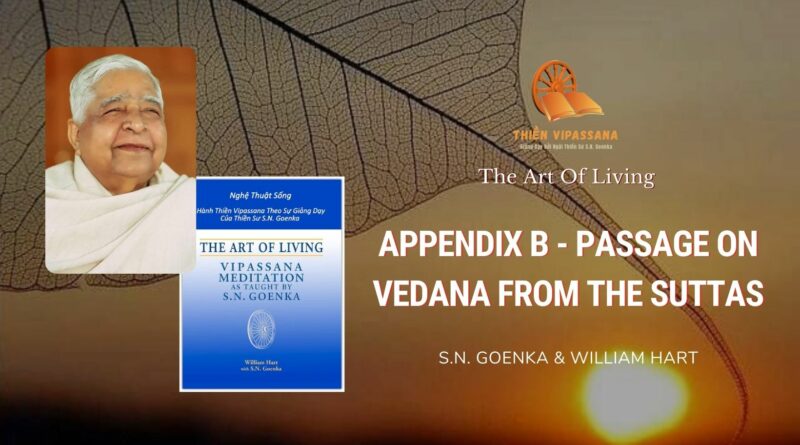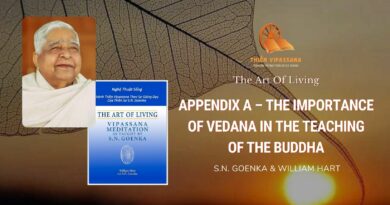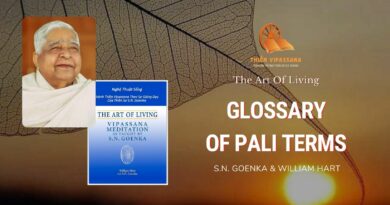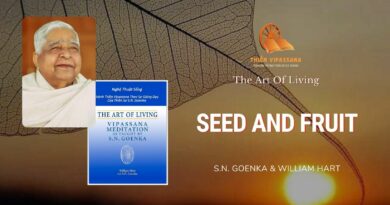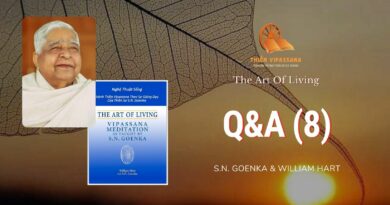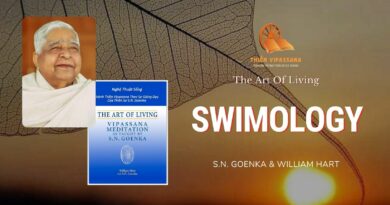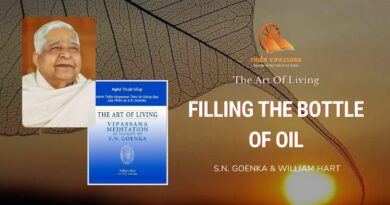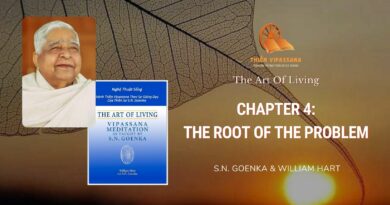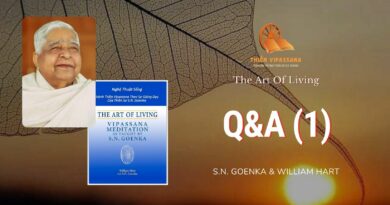Appendix B. PASSAGE ON VEDANĀ FROM THE SUTTAS
In his discourses the Buddha frequently referred to the importance of awareness of sensation. Here is a small selection of passages on the subject.
Through the sky blow many different winds, from east and west, from north and south, dust-laden or dustless, cold or hot, fierce gales or gentle breezes—many winds blow. In the same way, in the body sensations arise, pleasant, unpleasant, or neutral. When a meditator, practising ardently, does not neglect his faculty of thorough understanding (sampajañña), then such a wise person fully comprehends sensations. Having fully comprehended them, he becomes freed from all impurities in this very life. At life’s end, such a person, being established in Dhamma and understanding sensations perfectly, attains the indescribable stage beyond the conditioned world.
—S. XXXVI (II). ii. 12 (2), Paṭhama Ākāsa Sutta
And how does a meditator dwell observing body in body? In this case a meditator goes to the forest, to the foot of a tree, or to a solitary abode. There he sits down cross-legged with body erect, and fixes his attention in the area around the mouth. With awareness he breathes in and breathes out. Breathing in a long breath he knows rightly, “I am breathing in a long breath.” Breathing out a long breath he knows rightly, “I am breathing out a long breath.” Breathing in a short breath he knows rightly, “I am breathing in a short breath.” Breathing out a short breath he knows rightly, “I am breathing out a short breath.” “Feeling the entire body I shall breathe in”; thus he trains himself. “Feeling the entire body I shall breathe out”; thus he trains himself. “With bodily activities calmed I shall breathe in”; thus he train himself. “With bodily activities calmed, I shall breathe out”; thus he trains himself.
—D. 22/M. 10, Satipaṭṭhāna Sutta, Ānāpāna-pabbaṃ
When a sensation arises in the meditator, pleasant, unpleasant, or neutral, he understands, “A pleasant, unpleasant, or neutral sensation has arisen in me. It is based on something, it is not without a base. On what is it based? On this very body.” Thus he abides observing the impermanent nature of the sensation within the body.
—S. XXXVI (II). i. 7, Paṭhama Gelañña Sutta
The meditator understands, “There has arisen in me this pleasant, unpleasant, or neutral experience. It is composed, of a gross nature, dependent on conditions. But what really exists, what is most excellent, is equanimity.” Whether a pleasant experience has arisen in him, or an unpleasant, or a neutral one, it ceases, but equanimity remains.
—M. 152, Indriya Bhāvanā Sutta
There are three types of sensation: pleasant, unpleasant, and neutral. All three are impermanent, composed, dependent on conditions, subject to decay, to decline, to fading away, to ceasing. Seeing this reality, the well-instructed follower of the Noble Path becomes equanimous toward pleasant, unpleasant, and neutral sensations. By developing equanimity, he becomes detached; by developing detachment, he becomes liberated.
—M. 74, Dīghanakha Sutta
If a meditator abides observing the impermanence of pleasant sensation within the body, its decline, fading away and ceasing, and also observing his own relinquishing of attachment to such sensation, then his underlying conditioning of craving for pleasant sensation within the body is eliminated. If he abides observing the impermanence of unpleasant sensation within the body, then his underlying conditioning of aversion toward unpleasant sensation within the body is eliminated. If he abides observing the impermanence of neutral sensation within the body, then his underlying conditioning of ignorance toward neutral sensation within the body is eliminated.
—S. XXXVI (II). i. 7, Paṭhama Gelañña Sutta
When his underlying conditionings of craving for pleasant sensation, of aversion toward unpleasant sensation, and of ignorance toward neutral sensation are eradicated, the meditator is called one who is totally free of underlying conditionings, who has seen the truth, who has cut off all craving and aversion, who has broken all bondages, who has fully realized the illusory nature of the ego, who has made an end of suffering.
—S. XXXVI (II). i. 3, Pahāna Sutta
The view of reality as it is becomes his right view. Thought of reality as it is becomes his right thought. Effort toward reality as it is becomes his right effort. Awareness of reality as it is becomes his right awareness. Concentration on reality as it is becomes his right concentration. His actions of body and speech and his livelihood become truly purified. Thus the Noble Eightfold Path advances in him toward development and fulfillment.
—M. 149, Mahā-Saḷāyatanika Sutta
The faithful follower of the Noble Path makes efforts, and by persisting in his efforts becomes mindful, and by remaining mindful becomes concentrated, and by maintaining concentration develops right understanding, and by understanding rightly develops real faith, being confident in knowing, “Those truths of which before I had only heard, now I dwell having experienced them directly within the body, and I observe them with penetrating insight.”
—S. XLVIII (IV). v. 10 (50), Āpana Sutta (spoken by Sāriputta, chief disciple of the Buddha)
Bài viết này được trích từ cuốn sách The Art Of Living – Thiền Sư S.N.Goenka và William Hart.

